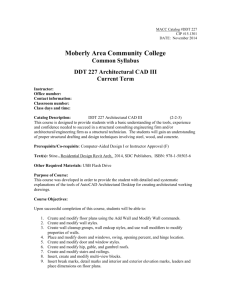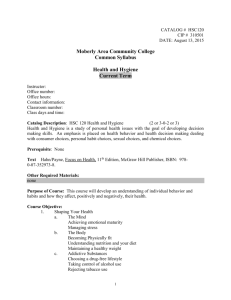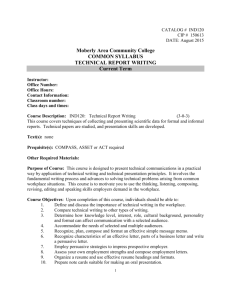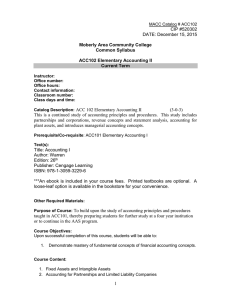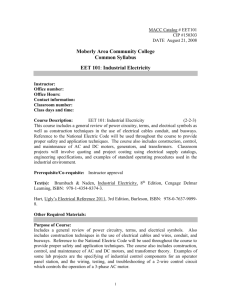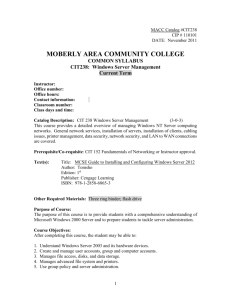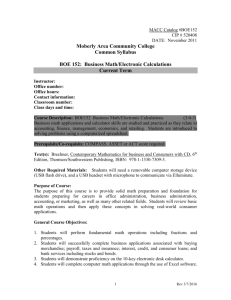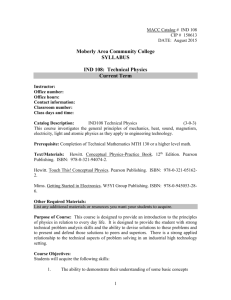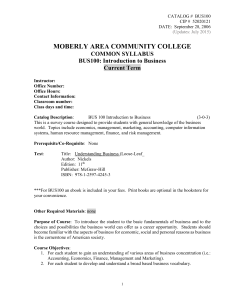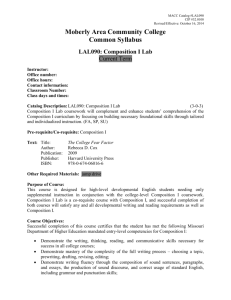BUS 150 Business Communications
advertisement
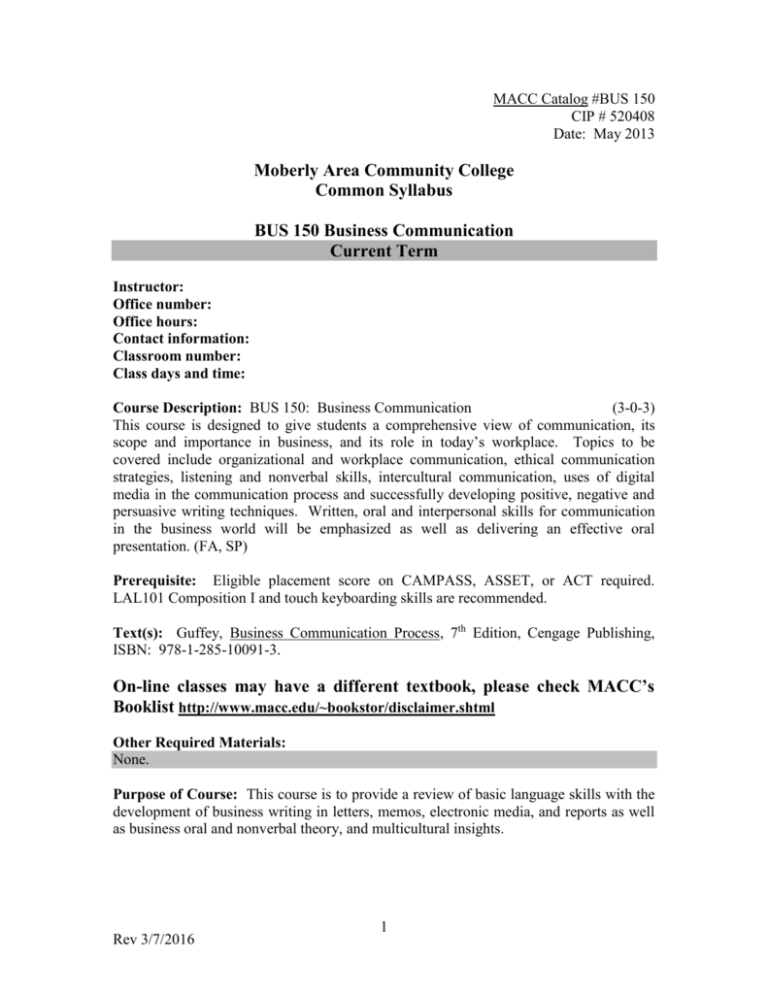
MACC Catalog #BUS 150 CIP # 520408 Date: May 2013 Moberly Area Community College Common Syllabus BUS 150 Business Communication Current Term Instructor: Office number: Office hours: Contact information: Classroom number: Class days and time: Course Description: BUS 150: Business Communication (3-0-3) This course is designed to give students a comprehensive view of communication, its scope and importance in business, and its role in today’s workplace. Topics to be covered include organizational and workplace communication, ethical communication strategies, listening and nonverbal skills, intercultural communication, uses of digital media in the communication process and successfully developing positive, negative and persuasive writing techniques. Written, oral and interpersonal skills for communication in the business world will be emphasized as well as delivering an effective oral presentation. (FA, SP) Prerequisite: Eligible placement score on CAMPASS, ASSET, or ACT required. LAL101 Composition I and touch keyboarding skills are recommended. Text(s): Guffey, Business Communication Process, 7th Edition, Cengage Publishing, ISBN: 978-1-285-10091-3. On-line classes may have a different textbook, please check MACC’s Booklist http://www.macc.edu/~bookstor/disclaimer.shtml Other Required Materials: None. Purpose of Course: This course is to provide a review of basic language skills with the development of business writing in letters, memos, electronic media, and reports as well as business oral and nonverbal theory, and multicultural insights. Rev 3/7/2016 1 Course Objectives: Upon successful completion of this course, students will be able to: Demonstrate effective listening skills Demonstrate knowledge of correct format and styles for business letters, memorandums and reports. Communicate effectively in written form. Produce and distribute appropriately formatted documents. Demonstrate effective speaking skills. Plan, develop and deliver oral presentations. Demonstrate sensitivity in communicating with a diverse workforce. Develop communication skills for an international audience. Use the telephone effectively for oral business communications. Demonstrate proper use of electronic mail in a business environment. Course Content: Foundations of Communication-theory of communication, listening and nonverbal skills, communicating across cultures The Writing Process-prewriting, organizing and writing business messages, and revising business messages Business Correspondence-e-mail and memos, routine letters and good will messages, persuasive and sales messages Reports and Proposals-preparing to write business reports, organizing and writing typical business reports, proposals and formal reports Presentations-speaking skills and presentation media Assessment of Student Learning: Students’ final grades will be based upon homework grades, in-class activities, quizzes, tests, and presentations. A comprehensive test of knowledge and a course portfolio will assess mastery of the course material and account for the final exam. Homework Oral Presentation Research Project Quizzes Tests (3) Portfolio Final Exam Total 550 points 100 points 100 points 30 points 200 points (100 points each) 150 points 150 points 1380 points Description of Major Assignment(s)/Projects: Portfolio Student portfolios will provide the students with a professional sample of business correspondence and the rules of grammar for future use. The portfolio will contain samples of business letters, sample business memoranda, a copy of a travel report, a progress report, a periodic report, a meeting agenda and a copy of minutes to a meeting. Rev 3/7/2016 2 Oral Presentation Students will give a 4 to 6 minute oral presentation to the class. The presentation will include a PowerPoint presentation that includes clip art of other inserts, animation, and transition. Students must work with other class members in teams to develop their presentation. Instructor Policies: Academic Dishonesty: MACC board policy is as follows: “Academic dishonesty by students damages institutional credibility and unfairly jeopardizes honest students; therefore, it will not be tolerated in any form.” Forms of academic dishonesty include but are not limited to the following: violations of copyright law, plagiarism, fabrication, cheating, collusion, and other academic misconduct. Incidents of dishonesty regarding assignments, examinations, classroom/laboratory activities, and/or the submission of misleading or false information to the College will be treated seriously. The procedure for handling academic dishonesty is outlined in the Student Handbook (Policy Handbook M.010). In cases of alleged academic dishonesty, the burden of proof is on the student, not on the instructor. Attendance: Any student who misses two consecutive weeks of class during a regular sixteen-week semester or the equivalent proportion of class time during a shorter session will be dropped from the class by the instructor unless acceptable justification is supplied. Additionally, any student who misses more than one-fourth of the entire number of in-seat class meetings in a regular 16-week semester or the equivalent proportion of class time during a shorter session, may be dropped from that class by the instructor if, in the opinion of the instructor, the student does not have reasonable opportunity to succeed in the class. A student’s attendance rate will be calculated based upon the first day of the semester (not the student’s date of enrollment in the course). Student attendance must be defined in a different manner for online, hybrid, and virtual courses. Student attendance in these courses is defined as active participation in the course. Online, hybrid, and virtual courses will, at a minimum, have weekly mechanisms for student participation, such as any or all of the following methods: a. Completion of quizzes or exams b. Submission of assignments c. Participation in threaded discussions d. Communication with the instructor A student who does not participate in an online, hybrid, or virtual course for two consecutive weeks will be dropped by the instructor unless acceptable justification is supplied. As with ground courses, a student’s attendance rate in online courses will also be calculated based upon the first day of the semester. If a student does not demonstrate active participation in the online course within the first two weeks (or the equivalent proportion of class time during a short session), the student will be dropped as “never attended.” Simply logging into an online class does not constitute active participation. Rev 3/7/2016 3 Students should be aware that their dropping a course and their last date of attendance in the course may impact their financial aid. Tardiness: Three late arrivals will constitute one absence. Make-up and late work: No late work will be accepted. Students who miss class should turn in their assignment(s) at the next class meeting. Students may also turn in their homework as e-mail attachments. Schedule of Student Assignment and Activities: Refer to course outline ADA Statement Students who have disabilities that qualify under the Americans with Disabilities Act may register for assistance through the Office of Access and ADA Services. Students are invited to contact the Access Office to confidentially discuss disability information, academic accommodations, appropriate documentation and procedures. For more information, please call either the Moberly office at (660) 263-4100 x 11240 or the Columbia office at (573) 234-1067 x 12120, or visit our web page at http://www.macc.edu/index.php/services/access-office. Rev 3/7/2016 4
